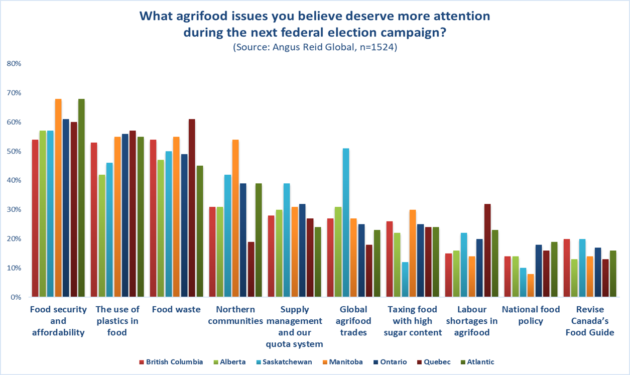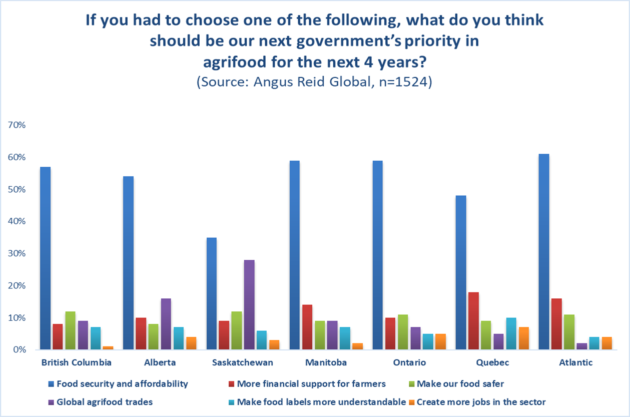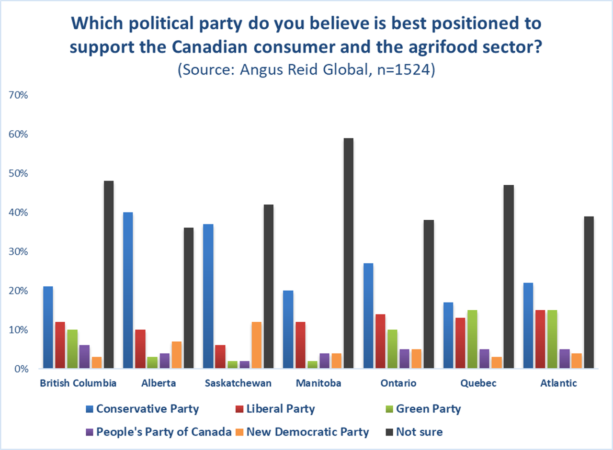
Canadians divided on agrifood trade policy, survey finds
Food in Canada
Food In Canada Regulation Canada Dalhousie University election Study Survey Family in the supermarket. Beautiful young mom and her little daughter are looking at each other and smiling, in the background dad is choosing goods
Family in the supermarket. Beautiful young mom and her little daughter are looking at each other and smiling, in the background dad is choosing goods A recent survey conducted by Angus Reid Global on Sept. 9, with the support of Dalhousie University’s Agri-Food Analytics Lab, suggests Canadians’ expectations are consistent with what we have seen with other elections in the past. A total of 31 per cent of Canadians believe food and agriculture will be a prime electoral issue for the upcoming federal elections. Alberta, Manitoba and Ontario have the highest lowest of optimism, at 25 per cent, and Quebec, the highest, at 46 per cent.
However, when asked about issues some regions stand out. Participants could choose more than one issue, dropping less popular issues. Significantly, three out of every five Canadians believe food security and affordability to be one of the most important issues for this election. Both Manitoba and the Atlantic Region have the most respondents believing food security and affordability as an important election issue in agrifood for this year, at 68 per cent. The use of plastics in food has clearly caught the attention of voters in recent months. The survey suggests that 54 per cent of respondents believe the use of plastics in food to be an important electoral issue. All regions come in above 50 per cent on this issue, except for Alberta and Saskatchewan.

The survey suggests that food waste is the third most important issue in agrifood for Canadians for this coming election. A total of 61 per cent of Quebecers believe food waste to be of great importance for this upcoming election, compared with 45 per cent in the Atlantic Region. Feeding Northern communities also ranked high, with 54 per cent of Manitobans seeing it as an important issue for this fall’s campaign, compared with 19 per cent in Quebec.
The country is divided on agrifood trade policy. Supply management and our quota system, a protectionist policy that goes against global trades, is also an issue Canadians care about. Saskatchewan ranked the highest at 35 per cent, even if generally, supply management is not an important issue in the province. Where supply management is economically influential, 32 per cent Ontarians and 27 per cent of Quebecers believe this to be an important issue. On the other side of the trade spectrum, clearly, respondents in Saskatchewan have trades on their minds. A total of 51 per cent believe global trades for the agrifood sector to be an important issue for this campaign, compared to only 19 per cent in Quebec.
Taxing food with high sugar content comes up from time to time during elections around the world. A total of 30 per cent of Manitobans see taxing food with high sugar content an important electoral issue, compared to 12 per cent in Saskatchewan.
Labour shortages are a reality everywhere in the agrifood sector these days. However, some regions see this as more important than others. A total of 32 per cent of Quebecers see labour in the agrifood sector to be a very important agrifood policy issue right now, followed by the Atlantic Region with 23 per cent.
During their term, the Liberals offered Canadians a National Food Policy and a new food guide. Only 16 per cent expect the next government to set a new course and revise the new food guide. For changes to the National Food Policy, rates are generally higher in the east of the country but don’t exceed 19 per cent. Both British Columbia and Manitoba have the highest rate of respondents wanting the new food guide to be revised, at 20 per cent.
Looking ahead, Canadians were asked about priorities for the next government in agrifood. Participants were only to select one priority. The most important issue for most Canadians remains food security and affordability, at 55 per cent. Other issues garnered much less support.

Support for farmers ranked as the second most import issue, with the support of 12 per cent of Canadians. Quebec is where most respondents see support to farmers as the most significant, at 18 per cent, followed by the Atlantic Region at 16 per cent. Food safety is the third-highest ranked issue for the next government, at 10 per cent, which received equal support in most regions. Global trades received the support of 28 per cent of respondents in Saskatchewan. In the East, trades are not considered important for the next government. About 5 per cent of Quebecers see this as an important issue while in the Atlantic, only 2 per cent do.

Canadians were asked which national party is best positioned to support the agrifood sector. The Conservatives are seen as the best national stewards for the agrifood sector, followed by the Liberals and the Green Party. The Conservatives rank first in every region. The Green Party ranks second in both Quebec and in the Atlantic. Interestingly, the New Democratic Party ranks second in Saskatchewan. In fact, the People’s Party of Canada support on agrifood policy equals the New Democratic Party’s, nationally. The New Democratic Party is considered as the best positioned to deal with food affordability, while the Green Party is seen as championing food waste. However, the number of respondents who are unsure is very high, at 42 per cent nationwide.
Print this page